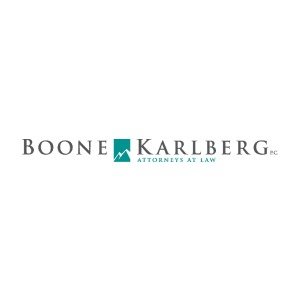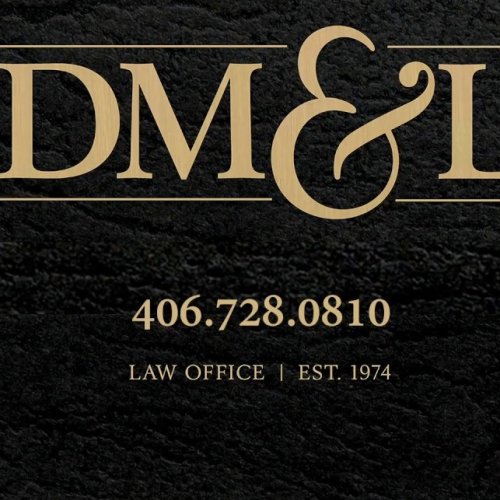Best Commercial Real Estate Lawyers in Montana
Share your needs with us, get contacted by law firms.
Free. Takes 2 min.
Free Guide to Hiring a Real Estate Lawyer
Or refine your search by selecting a city:
List of the best lawyers in Montana, United States
About Commercial Real Estate Law in Montana, United States
Commercial real estate law in Montana covers the rules and regulations governing the purchase, sale, leasing, financing, development, and management of property used for business purposes. These properties typically include office buildings, retail centers, industrial parks, warehouses, hotels, and land for commercial development. Montana's real estate market has its unique characteristics, with large rural areas, growing urban centers, and diverse industry needs. Navigating commercial real estate transactions in Montana involves understanding both state-specific statutes and local ordinances, which is why legal guidance is often important for buyers, sellers, investors, and developers.
Why You May Need a Lawyer
Many aspects of commercial real estate are complex, and there are several situations where consulting a qualified attorney is beneficial:
- Purchasing or Selling Property: Legal assistance ensures contracts are fair, title searches are thorough, and all disclosures are made, reducing your risk of future disputes.
- Negotiating Leases: Commercial leases are often lengthy and involve unique terms. Lawyers can help navigate tenant improvements, rent escalation clauses, renewal options, and early termination terms.
- Land Use and Zoning Issues: If you plan to develop or change the use of property, an attorney can guide you through zoning applications, variances, or conditional use permits, and represent you before local boards or commissions.
- Environmental Concerns: Montana's strict environmental regulations may affect your property, especially if it has a history of industrial use. Lawyers can help with compliance and environmental due diligence.
- Financing and Investment: Commercial deals often involve complex financing and partnership structures. Attorneys can ensure proper documentation and protect your interests.
- Dispute Resolution: Whether it is a breach of contract, eviction, or construction defect, a lawyer can advocate for you in negotiations, mediation, or court proceedings.
Local Laws Overview
Commercial real estate in Montana is governed by a combination of state statutes, local ordinances, and federal regulations. Here are some key aspects relevant to commercial real estate in the state:
- Property Ownership: Montana law allows both individuals and entities to own commercial property, subject to state recording and documentation requirements.
- Landlord-Tenant Law: Commercial leases in Montana are flexible but must comply with contract law. Unlike residential leases, parties have greater freedom to negotiate terms.
- Zoning and Land Use: Local government units regulate permissible uses for parcels through zoning codes and master plans. Permits or variances may be required for certain uses or developments.
- Environmental Regulations: The Montana Department of Environmental Quality enforces state and federal environmental laws relating to hazardous materials, air quality, water rights, and land contamination.
- Contract Law: All sales and leases must comply with Montana statutes regarding contracts, including requirements for written agreements and the statute of frauds.
- Disclosure Requirements: Sellers are required to disclose certain known material defects or environmental hazards that may affect the value or use of the property.
- Recording and Title Searches: Transactions must be documented with the County Clerk and Recorder. Title insurance and searches are often used to verify clean ownership.
- Easements and Access: Montana law recognizes multiple types of easements that may affect property, including access roads, utilities, and water rights.
Frequently Asked Questions
What is considered commercial real estate in Montana?
Commercial real estate refers to property intended for business activities. This includes office buildings, retail shops, hotels, industrial warehouses, and land for commercial development. Residential properties like apartments may also be classified as commercial if used for investment purposes.
Do I need a lawyer to buy or sell commercial real estate in Montana?
While you are not legally required to have a lawyer, it is highly recommended due to the complexity of the transactions and the importance of protecting your interests. Lawyers can help avoid costly mistakes and ensure compliance with Montana laws.
How are commercial leases different from residential leases in Montana?
Commercial leases offer more negotiation flexibility and fewer statutory tenant protections compared to residential leases. Business parties can arrange almost any terms, but legal review is crucial to avoid unfavorable conditions or hidden risks.
What disclosures are required in a commercial property sale?
In Montana, sellers must disclose known material defects and any environmental hazards. Specific requirements may vary based on the location and type of property, so it is wise to consult legal counsel to ensure full compliance.
How do zoning laws impact my commercial property?
Zoning laws determine permitted uses, building heights, setbacks, and other development standards for your property. Violations can result in legal action or the inability to use the property as intended, so checking zoning before purchase or development is essential.
What is a title search, and why is it important?
A title search verifies ownership history and identifies any legal claims, liens, or easements attached to the property. This process helps prevent ownership disputes or unexpected costs after purchase.
What are easements, and how do they affect commercial property?
An easement grants someone else the right to use part of your property for a specific purpose, such as utility lines or access roads. Review all easements during the title search to understand their impact on your property rights.
How can environmental regulations affect my commercial property?
Montana enforces strict rules regarding hazardous waste, air and water protection, and land contamination. Before purchase or development, environmental assessments may be required to comply with regulations and avoid liability.
Can I develop any type of business on my property?
Not always. Zoning rules, local ordinances, and property deed restrictions may limit the type of business activities allowed. Always check local land use regulations before proceeding.
What happens if a commercial lease or contract is breached?
Breach of contract can result in legal remedies such as damages, eviction, or specific performance. Having clear terms and remedies spelled out in the contract, reviewed by an attorney, helps protect your interests if a dispute arises.
Additional Resources
Montana has several agencies and organizations that provide helpful information or regulation of commercial real estate:
- Montana Department of Environmental Quality (DEQ): Regulates environmental laws, including land use and remediation.
- Montana Department of Revenue - Property Assessment Division: Handles property taxes and assessment procedures.
- County Clerk and Recorder Offices: Responsible for recording property documents and deeds at the local level.
- Montana Board of Realty Regulation: Licenses real estate professionals and can provide consumer guidance.
- Local Planning and Zoning Departments: Offers information on local land use regulations, permits, and developments.
- Local Bar Associations: Can refer you to attorneys specializing in commercial real estate law.
Next Steps
If you are facing a legal issue or planning a transaction involving commercial real estate in Montana, consider the following steps:
- Document Your Needs: Gather all relevant paperwork, including property records, leases, contracts, and correspondence.
- Consult a Qualified Attorney: Seek out a lawyer with experience in Montana commercial real estate law to review your documents and advise you of your rights and obligations.
- Contact Local Regulatory Bodies: Reach out to city or county planning and zoning offices for specific rules that may affect your property or project.
- Request a Title Search: Ensure there are no legal barriers, outstanding liens, or easements affecting your property.
- Perform Environmental Due Diligence: Determine if your property is subject to special environmental scrutiny or remediation requirements.
- Negotiate in Good Faith: Whether you are leasing, buying, or selling, approach negotiation with clear objectives and a willingness to compromise, but always protect your legal interests with professional guidance.
Taking these steps can help you avoid costly mistakes, streamline your transaction, and protect your investment in Montana's commercial real estate market.
Lawzana helps you find the best lawyers and law firms in Montana through a curated and pre-screened list of qualified legal professionals. Our platform offers rankings and detailed profiles of attorneys and law firms, allowing you to compare based on practice areas, including Commercial Real Estate, experience, and client feedback.
Each profile includes a description of the firm's areas of practice, client reviews, team members and partners, year of establishment, spoken languages, office locations, contact information, social media presence, and any published articles or resources. Most firms on our platform speak English and are experienced in both local and international legal matters.
Get a quote from top-rated law firms in Montana, United States — quickly, securely, and without unnecessary hassle.
Disclaimer:
The information provided on this page is for general informational purposes only and does not constitute legal advice. While we strive to ensure the accuracy and relevance of the content, legal information may change over time, and interpretations of the law can vary. You should always consult with a qualified legal professional for advice specific to your situation.
We disclaim all liability for actions taken or not taken based on the content of this page. If you believe any information is incorrect or outdated, please contact us, and we will review and update it where appropriate.
Browse commercial real estate law firms by city in Montana
Refine your search by selecting a city.















